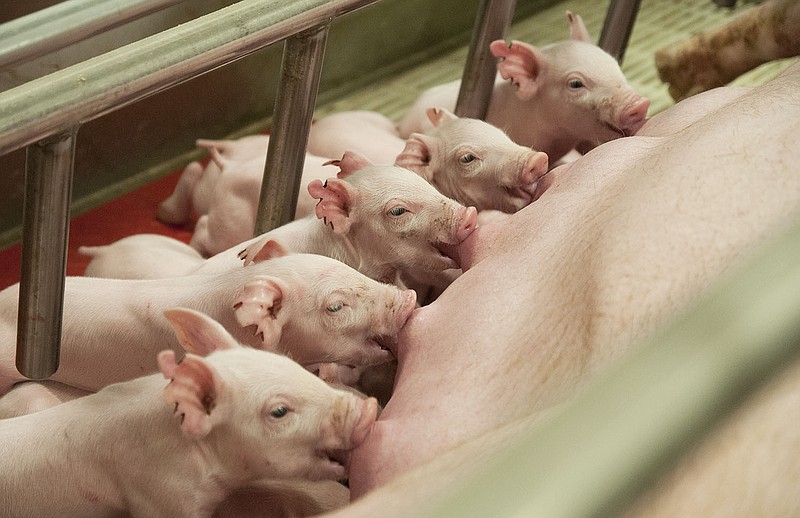Around 80-90 farmers and rural residents gathered in the chapel of Oakland Baptist Church on Thursday to discuss the proposed concentrated animal feeding operation Tipton East, which would be located on the southern edge of Cooper County near Moniteau County and the community of Clarksburg.
Tensions ran high at times, but everyone agreed residents need to do balanced research from credible sources before making their own decisions.
The meeting was led by former Cooper County Commissioner Bill Embry, who opposed the installation of Tipton East. He was joined in contesting the proposed CAFO by concerned farmer Fred Williams, Missouri Rural Crisis Center Communication Director Tim Gibbons, Howard County resident Rhonda Perry and several other attendants.
According to the application by Pipestone System affiliate PVC Management II LLC, the operation on Renshaw Drive would consist of a gestation building housing 4,704 sows, a farrowing building housing 1,080 sows, and a gilt-development unit for 1,620 females weighing more than 55 pounds and 324 nursery pigs.
Pipestone System representative Steve Menke said the operation would employ about 17 full-time workers. Laborers would be paid a starting wage of $14 per hour, while managers could earn about $100,000 a year.
Menke described Pipestone as a management company and steward for family farmers who invest in the organization, because they do not have the technology, expertise and means of production available to the company.
One of the attendants disputed that Pipestone was a part of family farming, because the family farms in their area are owned and operated by local people who are invested in the community.
Menke said Pipestone families often contribute to the communities the company operates in as they see fit, which Embry disputed.
"It's an economic drain," Embry said. "It's all about greed and money from out- of-state corporations. There will be no input to this community; Pipestone can say what they want to say."
Embry pointed out Tipton East could potentially increase the number of hogs under a Class IC CAFO, like the proposed Tipton East, to 7, 499 swine weighing more than 55 pounds and 29,999 swine weighing less than 55 pounds.
Menke responded that the operation has no intention to house anymore than the previously stipulated quantities. Pipestone wants to move to Cooper County because of issues with overcrowding and disease in Iowa, Minnesota and other areas where the company is highly present. He added increasing the number of hogs would cause the same problems the company is trying to avoid with Tipton East.
"You're coming here because it's clean," Williams responded. "I want to keep it clean."
Manure would be contained in 10-foot-deep pits below containment facilities, which would later be injected into Cooper County cropland surrounding the operation using a long hose. Hog carcasses would be composted in a separate, above-ground unit on site with a capacity of 186 tons per year.
Williams voiced concern with rodents, odor and other health concerns with having decomposing carcasses within about a mile of where several families live, including those with children like his own. Concerned residents also said they fear the runoff from these fields will contaminate nearby streams, ponds and potentially the area water table that many residents use to draw water from for their wells. The manure would be transported by hose, which many residents fear could eventually malfunction and cause leaks, as have occurred throughout Missouri in the past.
Menke said studies had been done with the University of Missouri Extension, and manure runoff would be minimal and not pose a threat to the environment.
Embry said the first line of defense to protect against health hazards is to pass a county health ordinance, which has been implemented in other Missouri counties. Cooper County commissioners are considering designing and implementing such an ordinance.
One unaffiliated resident voiced direct support for Tipton East. "We need to support all agriculture, whether it's corporate or family farms," said Taylor Tuttle, who added she was raised on a cattle and turkey CAFO. A few other attendants questioned the severity of environmental runoff and odor issues.
In the end, one resident stood in front of the audience and warned whether people are for or against Tipton East, they could not let the dispute tear apart a community that has worked together for decades.

